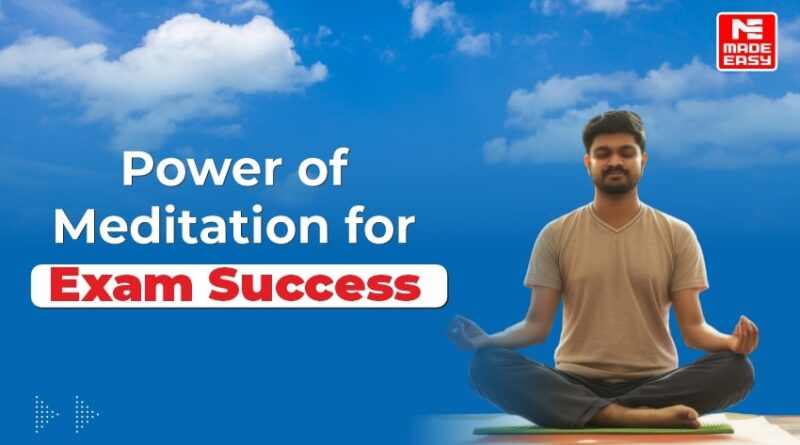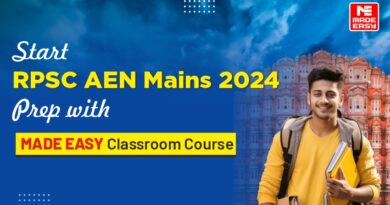Power of Meditation for Exam Success
Meditation, or the art of practicing mindfulness, has manifold benefits—be it health-related, spiritual advantages, or the mindfulness you gain. Due to its manifold advantages, meditation as a practice and routine attracts people of all ages and various health and mental conditions. The healthy want to maintain their condition, and the unhealthy want to improve theirs. The young aim to achieve increased focus and mindfulness, whereas the elderly want to divert their minds from the tensions around them and gain calmness and serenity.
Not only the elderly, spiritual speakers, and trained professionals, but even UPSC, GATE, or other competitive exam aspirants can harness the power of meditation to lead a stress-free and focused learning period during their exam preparation. The power of meditation is simply working with the mind through simple and easy techniques to channel its maximum energy into the area that you wish to. Meditation advantages include an improved sense of presence, calmness of the brain, increased attentiveness and focus, and enhancement of human qualities like empathy and patience. In this blog, we discuss how the power of meditation can be advantageous in exam preparation for UPSC, GATE, or other competitive exams.
10 benefits of meditation for students.
1. A calm brain is a better workstation: Meditation is a proven way of finding inner peace, and thus it helps in staying calm and composed. Needless to say, peace of mind is a prerequisite for the brain to work efficiently, especially for aspirants of exams like UPSC, GATE, SSC, etc. Most aspirants encounter the problem of utilizing only 50–60% of their study time efficiently for their preparation, while the rest is wasted due to a lack of mindfulness, worrying about the future, stressing about goals, or thinking about other tasks while trying to do another. These problems of anxiety and stress can also be tackled through the power of meditation.
2. Reduced anxiety leads to increased scores: While one meditates, the sole purpose of the exercise is to increase the oxygen flow into and out of the brain. As oxygen flow increases, so does blood flow, allowing the brain to function more efficiently. By taking this little break for the brain, one allows the mind to achieve peace so that it won’t become stressed or anxious. One of the main reasons for anxiety is overthinking about the future, goals, results, and everything else. Giving both the mind and oneself a break definitely helps reduce anxiety and stress in daily life. Moreover, it helps one channel all their workable energy into exam preparation.
3. More energy, more efficiency: UPSC exam preparation demands rigorous hard work, and thus an aspirant needs to have a lot of energy for doing that. One of the benefits of meditation is that it keeps laziness at bay, leaving the mind and body fresh and energetic throughout the day. One feels less urge for naps and sleep breaks to keep the mind fresh if the nap breaks can rather be replaced with small breaks of meditation. Moreover, at the starting of the preparation phase, many aspirants face an issue with long study hours, which can also be taken care of with the help of meditation.
4. Longer settings can be pain-free: To study continuously for several hours is not as much of a problem as being mindful and equally attentive throughout the span. All the aspirants, at some point, find it difficult to maintain long spans of sitting. Not to mention, some aspirants even find it tough to sit through the 3-hours duration of the exam continuously. To their rescue, a study on regular mindfulness meditation showed that the participants could focus on a task for a long period, and they were able to reorient and maintain attention reaping the benefits of meditation. Not only does meditation help in maintaining long study hours, but also in being more creative and applying oneself better in competitive exams.
5. Sharper the brain, better the grades: It is believed that students who practice meditation have higher IQ levels than others. A plausible reason is that meditation makes the brain more alert and sharp. When aspirants are able to apply their complete attention to the task at hand, they are more likely to attempt questions in relatively less time, in a more creative manner, and write them down in the best possible way. With the introduction of QCAB in the UPSC exam, this is one quality that all aspirants must have. Many aspirants complain of forgetting basic formulae in the exam or being unable to write down even what they knew in the ESE. Meditation can help with this as well.
6. To know is important, what is more, important is to apply: To have a clear mind free of any distractions is essential for both learning and application. One of the important benefits of meditation is that it helps clear the mind. Whether in class while learning or outside class while applying, clarity of mind is important for both grasping and reproduction. Often in exams, we are unable to pen down even what we absolutely know. Clarity of mind helps in reproducing the answer in a structured way instead of jumbling the content. It also helps keep any kind of distractions at bay.
7. Farther the distractions, the nearer the success: Facebook, WhatsApp, YouTube, Instagram—to put it briefly, our mobiles, laptops, and all sorts of digital screens sometimes do us more harm than good in exam preparation. Even if you are completely determined to stay away from these distractions by installing apps to limit phone use and finding alternatives, it is essential that your brain wants the same. To train your brain to keep these distractions at bay, meditation can be a helpful tool. The calmness of the brain is the power of meditation. It helps in leading a happy and confident life.
8. Happy from the inside, confident from the outside: As a result of all the other benefits of meditation, you become happier and more confident than before. Aspirants of the UPSC exam who meditate regularly develop the ability to handle stress and maintain their calm even in pressurized situations. These qualities affect their self-esteem, emotional competence, and effectiveness. Improved results bring happiness, and meditation helps in improving results, so it becomes more of a chain reaction initiated by meditation. The advantages of meditation can also help one maintain the best of their health and get rid of any kind of distraction and addiction
9. A healthy mind resides in a healthy body: Aspirants preparing for the UPSC exam mostly stay away from their homes and families to study in solace. However, what becomes more important in such circumstances is taking proper care of one’s health and body. The benefits of meditation are that it lowers the risk of many heart ailments later in life, helps reduce blood pressure, and helps you stay fit in general. Research has also shown that meditation may help people learn to redirect their attention, increase their willpower, control their emotions and impulses, and increase their understanding of the causes behind certain addictive behaviors. It may also help control food cravings.
10. Sleep tight, study right: A relaxed mind helps in proper learning, and a good night’s sleep can refresh the mind. The quality of sleep, the sleep cycle, and the daily routine in general are seen to improve with meditation. A meditative mind improves the quality of your sleep so that you wake up feeling refreshed the next day. This makes the mind ready to receive information without feeling tired or getting bored.
Before diving deep into the steps to get started, let us find the answers to some commonly asked questions about the power of meditation for students.
What is the best way of meditation for a student?
With the rise in awareness about meditation in the last few years, several meditation gurus have introduced a wide range of techniques for different age groups. Therefore, it becomes critical to choose the best meditation technique to reap its benefits for students.
Mindfulness meditation is the best form of meditation for students. Practicing this specific type of meditation has helped several students improve their focus and attention while studying according to their schedule. This kind of meditation is also known as guided meditation. Once you practice mindfulness meditation a few times, you will notice its impact on your study schedule and subject retention abilities. Every student should try it a few times to understand the power of meditation and reap the above-mentioned benefits. Students can even combine the power of meditation with other mindfulness exercises such as mindful breathing, color breathing, the five senses, the break-time bell, and daily gratitude exercises.
How to do meditation for students?
If you are a student and want to reap the benefits of the power of meditation, then congratulations on your future self! Now that you have understood the importance of meditation, let us look at the expert-recommended ways students can use to improve their mental, emotional, and physical well-being in the coming months.
- Calm yourself and choose a suitable location: If you want to reap the best benefits of meditation, you must understand that telling yourself to stay calm helps greatly. In this way, you can truly cherish the power of meditation and see the real change in your overall well-being.
- Keep your body straight: Most students feel lazy to sit straight for any activity. However, it is important to understand that our body must be in a straight position while practicing meditation. Do not try to pressurize yourself to straighten yourself. Follow the body’s natural curvature, and you are good to go with practicing meditation.
- Notice your legs: During meditation, one’s body must be in a stable position. Therefore, you need to place your legs in the resting position before you start the meditation session. After a few practice sessions, you will observe that your legs stabilize automatically during these meditation sessions. It will also contribute to realizing the meditation powers.
- Check your arms: Usually, students have restless minds, which makes them move toward their smartphones and smart devices. If you find yourself stuck in a similar situation, you must prioritize positive self-talk and stabilize your arms parallel to your straight upper body.
- Calm your eyes: Human eyes tend to wander throughout the day except for sleep time. The best meditation for students has the ability to calm our minds. As a student getting started with the meditation technique, you must focus both your eyes in one particular direction. It will help you fully reap the benefits of meditation.
- Engage while you breathe: Initially, it is difficult to meditate with complete focus, but with consistent practice, you can meditate mindfully. Over a period, you will observe that your entire focus is on your breathing and its pattern while practicing the best meditation for students. This way, you will become an expert in the skill of mindfulness meditation and build your improved version in the upcoming weeks to months.
Meditation can act as a boon for getting a peaceful mind. Not just the elderly, adults, and professionals, but also students can harness the power of meditation and have a stress-free exam preparation. Now that you know several benefits of meditation as a UPSC aspirant, the next obvious step would be getting started with it.
However, meditation might seem boring for the students initially, but with time, you gain a nick of it. Also, as soon as you start practicing it regularly, the advantages will be pretty visible and before you know meditation would become an unavoidable part of your lifestyle forever. What you need to gain meditation advantages is, to be able to welcome peace to your mind. Here are a few steps that might get you started:
- Find a spot: Find a place to meditate, where you can practice it daily. A park, a terrace, or any open space is a good option. However, these are not absolutely mandatory. If you do not have access to any such place, any clean spot with good ventilation would be good to start.
- Choose a time: The time for meditation need not to be early morning only, but it is preferred to do it when the air is cleanest. If possible, choose one convenient time and practice meditation daily, at the same hour. Don’t try to meditate on a full stomach or you might fall asleep.
- Look after your posture: Do not try any complicated or advanced poses, in the beginning, just try to keep your back straight, without straining your spine, keep your legs folded, hands on your lap, sitting on the ground, and eyes closed, as you start to meditate. Be comfortable and wear comfortable clothes.
- Close your eyes and clear your mind: Now just close your eyes and focus on your breathing. It is relatively easier to meditate with closed eyes than open ones. Leave all the thoughts aside for a while and try only to concentrate on your breathing. Thoughts running through your mind may disrupt your mind but gently bring the attention towards breathing whenever that happens. Do not judge the thought or do not be let down if you cannot concentrate. It takes time so be patient
- A chant may help: For beginners, it may be tough to maintain that type of focus or concentration, for long without being distracted. it is therefore recommended that you chant a mantra or put on a track on your phone, which might help you to concentrate better.
The benefits of meditation are uncountable, while exam preparation for the UPSC exam, provided aspirants are ready to harness the power of meditation. Even a 15-minute session daily can bring wonderful benefits of meditation.
Many Many UPSC aspirants have been practicing meditation as part of their lifestyle to lead more energetic, peaceful, and stress-free lives during their exam preparation, and thereafter. They also recommend the same to all upcoming students, as a part of their strategy.
We hope this meditation blog contributes to the proper execution of your competitive exam strategy.
Dear Aspirants,
Your preparation for GATE, ESE, PSUs, and AE/JE is now smarter than ever — thanks to the MADE EASY YouTube channel.
This is not just a channel, but a complete strategy for success, where you get toppers strategies, PYQ–GTQ discussions, current affairs updates, and important job-related information, all delivered by the country’s best teachers and industry experts.
If you also want to stay one step ahead in the race to success, subscribe to MADE EASY on YouTube and stay connected with us on social media.
MADE EASY — where preparation happens with confidence.

MADE EASY is a well-organized institute, complete in all aspects, and provides quality guidance for both written and personality tests. MADE EASY has produced top-ranked students in ESE, GATE, and various public sector exams. The publishing team regularly writes exam-related blogs based on conversations with the faculty, helping students prepare effectively for their exams.





THANK YOU FOR THIS HELP REGARDING MEDITATION HERE EXPLAIN VERY FROM VERY BESICS SO THANK YOU
Dear Candidate,
Thanks for writing to us. We are glad to know that you like the article. Please keep visiting our blog to get similar content.
Regards,
Team MADE EASY
A lovely, inspiring article. I could read it again and again.